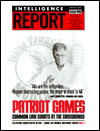The Montana Freeman’s philosophy, while rooted in antigovernment and ‘common law’ ideology, is also racist.
A nasty white swirl twists through the barrels of ink that Freemen have spilled while threatening their neighbors and conning the banks. Behind the mountain of documents filed with county courts and computer-generated bank drafts lies an attempt to reverse a fundamental constitutional precept: all Americans are equal before the law.
Just below the surface of the distinction that Freemen draw between “American nationals” (or “organic sovereigns”) and “U.S. citizens” is the Freemen’s oft-stated contention that the United States is peopled by two nations, not one.
For themselves and their Aryan kin, there is a republic where whites enjoy rights superior to those held by people of color and Jews. The latter are the unfortunate denizens of a “corporation” headquartered in Washington, D.C.
The attack on the Fourteenth Amendment is more fundamental to the Montana Freemen‘s ideology than all their specious reasoning about the “handwritten constitution” and changes in state seals, complaints about capitalization and leader LeRoy Schweitzer’s rants about the Uniform Commercial Code.
If it all sounds like gobbledy-gook, remember that the Freemen’s assertion of a constitutional distinction between white people and “Fourteenth Amendment citizens” is the latest in a long series of attempts to roll back constitutional protections.
After the Thirteenth Amendment ending slavery was adopted in 1865, the Fourteenth Amendment went on to enshrine the notion that “all persons born or naturalized” were U.S. citizens whose rights “could not be abridged.” But following the Reconstruction period after the Civil War, the Fourteenth Amendment went largely unenforced until the modern civil rights movement.
Dred Scott and Common Law
Since then it has come under attack again. Much of the current anti-immigrant fervor is aimed at abrogating Fourteenth Amendment protections for American-born children of immigrants. And many neo-Confederates and other ultraconservatives still contend the Fourteenth Amendment was passed unconstitutionally.
On the radical right, similar attacks came from the earliest incarnations of the Posse Comitatus, a violently anti-Semitic and anti-tax organization that raged through the Midwest in the 1970s and 1980s. Like the later Montana Freemen, the Posse claimed that farmers could escape their bank debts because they were “organic sovereigns,” not ordinary citizens.
The neo-Nazi Aryan Nations, in one of its more literate moments, argued in its newsletter for resurrection of Dred Scott, the notorious pre-Civil War Supreme Court decision that held that slaves had no constitutional rights.
And in the late 1980s, a Los Angeles attorney, Daniel Johnson, created the League of Pace Amendment Advocates to push for repeal of the Fourteenth Amendment. Unlike the Freemen, Pace Amendment ideologues were unencumbered by the bizarre and racist theology of Christian Identity, and their view was embraced for a time by white supremacists of all stripes.
Since Johnson let the Pace League fade, Oregonian Robert Wangrud, long an advocate of “white law,” has been the principal proponent of abolishing the Fourteenth Amendment and implementing “common law.”
Like Wangrud, most of the radical right today sees that kind of legalized racism as flowing from the “organic Constitution” — the Constitution and Bill of Rights, minus all succeeding amendments.
In the case of the Freemen, Schweitzer agreed, telling his followers to ignore later amendments. That, he said, was the “Biblically correct” interpretation of God’s law. “The law didn’t change,” he argued, “[only] the minds of the people changed.”
Legal scholars and historians trace an ever-expanding tradition of individual liberties from the Magna Carta to the U.S. Constitution and its amendments, a path leading from the divine right of kings to representative democracy.
But the Freemen see things differently. For them, this trajectory is less that of developing institutions than of an unchanging racial lineage.
The Biblical tribes of Israel, the Anglo-Saxons of medieval England and American whites today — they are all of a piece, a single, holy gene pool. The Book of Deutoronomy, the Magna Carta and the Constitution are all seen as God’s law, written only for God’s people: whites.
‘The Aryan, the Battle Axe’
The ultimate conclusion, according to Freemen followers, comes to this: LeRoy Schweitzer is not a thief with computer talent, but a high priest revealing the Word to Yahweh’s lost sheep.
“This is in the family,” Schweitzer instructed his students, “Israel, the lost sheep, the select, the elect, the peculiar treasure, the royal priesthood, the Aryan, the battle axe.” These were the white men who would people his common-law courts.
Schweitzer’s ideology is based on the white supremacist Christian Identity religion just as surely, then, as Richard Butler‘s Aryan Nations and Thom Robb’s Knights of the Ku Klux Klan. His importance lay in his particular mix of racism, the Constitution, religion and common law.
“The connection between the Bible and the Constitution is the common law,” one Freemen apologist wrote. “The common law is Biblical law applied.”
The Freemen’s commercial liens, their phony checks, the threats against local officials all derived from this cosmology, and particularly its distinction between two types of citizens, one blessed with God-given superiority over the other.
“The Freemen’s antigovernment rhetoric was not a case of supporting local control over federal,” explains Ken Toole, director of the Montana Human Rights Network. “It was their white racial nation against all others.”



